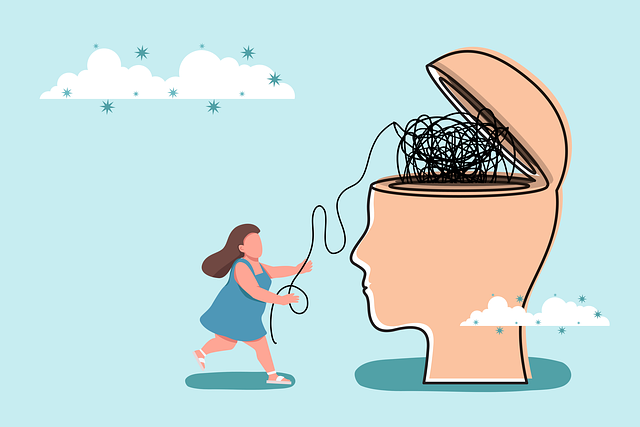Play therapy focuses on emotional well-being through coping skills development, using games and play as therapeutic tools. By identifying individual needs and tailoring strategies, therapists empower children to express emotions, process trauma, and build resilience. Incorporating effective coping techniques enhances mental wellness and reduces stigma, making it ideal for burnout prevention. Measuring success involves evaluating progress through standardized assessments and observations, fostering open conversations about mental health with parents and caregivers.
Coping skills development is a vital component of play therapy, offering a structured approach to enhance children’s emotional well-being. This article delves into the essentials of building resilient minds through play, exploring techniques tailored to individual needs. From understanding the foundation of coping strategies to implementing them in engaging play settings, each section guides therapists in fostering effective healing environments. Discover how measuring success can showcase the transformative power of play therapy in cultivating healthy coping mechanisms.
- Understanding Coping Skills: A Foundation for Play Therapy
- Identifying Individual Needs: Personalized Coping Strategies
- Implementing Effective Coping Techniques in Play Settings
- Measuring Success: Evaluating the Impact of Coping Skills Development
Understanding Coping Skills: A Foundation for Play Therapy

Play therapy, a therapeutic approach that utilizes play and creative expression to enhance emotional well-being, relies heavily on individuals’ coping skills. Understanding coping skills is thus foundational to effective play therapy. Coping mechanisms are the strategies people use to manage stress, overcome challenges, and maintain mental health. In the context of play therapy, these skills enable children to express their feelings, process traumatic experiences, and develop resilience in a safe and supportive environment.
Play therapists foster coping skill development through various methods tailored to each child’s unique needs. This involves encouraging positive self-talk, teaching problem-solving techniques, promoting mindfulness, and integrating compassion cultivation practices, all of which contribute to building resilience. Community outreach program implementation can also enhance these efforts by providing additional support systems and resources for both the children and their families, creating a holistic approach to coping skills development in play therapy.
Identifying Individual Needs: Personalized Coping Strategies

Identifying Individual Needs is a crucial step in developing effective coping skills tailored to each person’s unique circumstances and personality. Play therapy, a form of therapy that utilizes play and games as therapeutic tools, can be particularly beneficial in this process. By observing clients’ behaviors and interactions during play sessions, therapists gain valuable insights into their emotional states, past experiences, and triggers. This allows for the creation of personalized coping strategies that resonate with each individual’s needs.
For instance, a child struggling with anxiety might benefit from self-awareness exercises incorporated into play therapy. These exercises could involve using toy figures to act out scenarios, helping them identify and express their feelings in a safe environment. Similarly, adults seeking anxiety relief can learn self-care practices through interactive play sessions, fostering a sense of calm and resilience. This personalized approach ensures that coping strategies are not one-size-fits-all but rather targeted at the specific challenges and strengths of each client.
Implementing Effective Coping Techniques in Play Settings

In play therapy sessions, incorporating effective coping techniques can significantly enhance a child’s mental wellness and emotional resilience. Therapists skilled in this approach utilize play as a powerful tool to help young individuals process and manage their emotions, especially when dealing with challenging life experiences or symptoms of mental illness. By engaging in creative play, children can express themselves freely, explore healthy coping mechanisms, and reduce the stigma associated with mental health issues in a non-threatening manner. This method is particularly beneficial for addressing burnout prevention among children, as it provides a safe space to de-stress and recharge.
The therapy for play therapy setting allows for unique opportunities to teach children valuable coping skills tailored to their age and developmental stage. Through imaginative play, role-playing scenarios, and art activities, therapists can guide young clients towards developing adaptive coping strategies. These techniques empower them to face stressors, regulate emotions, and build self-confidence in managing their mental wellness, thereby fostering a more positive self-image and overall well-being.
Measuring Success: Evaluating the Impact of Coping Skills Development

Measuring success in coping skills development is a crucial aspect often overlooked but is essential to understanding the impact and effectiveness of therapy for play therapy sessions. Evaluating progress allows therapists to tailor interventions, ensuring that each child receives personalized support for their mental wellness journey. This process involves assessing changes in emotional regulation, problem-solving abilities, and overall resilience. By employing various tools, such as standardized assessments, observations during play activities, and direct communication with the child, therapists gain valuable insights into the progress made.
In the context of mental wellness podcast series production, discussing these evaluations publicly can inspire parents and caregivers to actively engage in their children’s therapy. Sharing success stories—including improvements in mood management—can encourage open conversations about mental health, destigmatizing these discussions and fostering a supportive environment for all.
Coping skills development is a vital component of play therapy, empowering children to navigate challenges and promote emotional well-being. By understanding individual needs and implementing effective techniques in play settings, therapists can create a supportive environment that fosters growth and resilience. Measuring success through evaluation ensures the impact of coping skills training, allowing for personalized adjustments and enhancing the overall therapeutic experience in play therapy.












